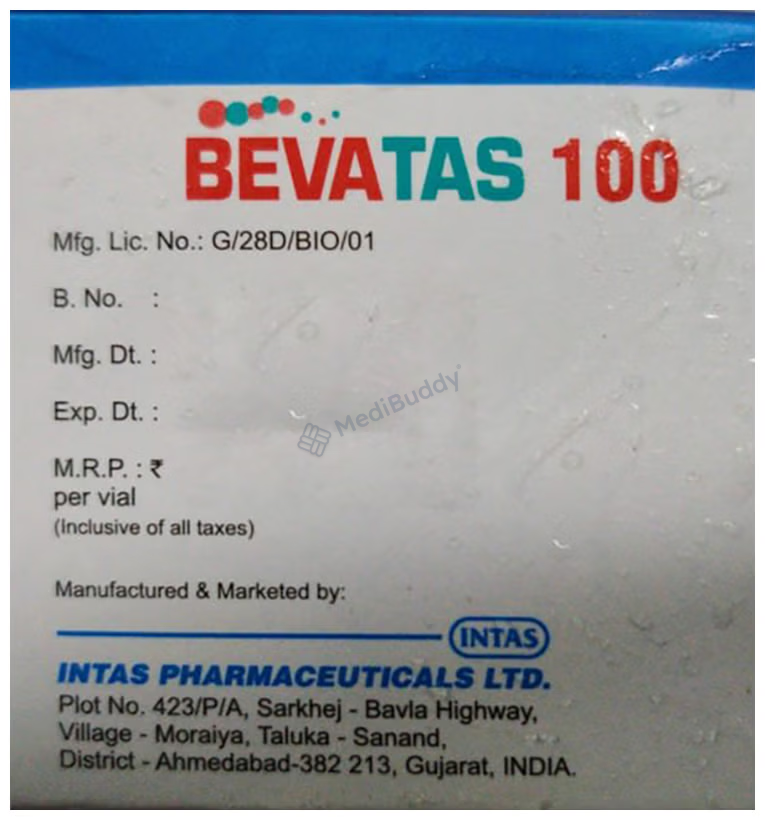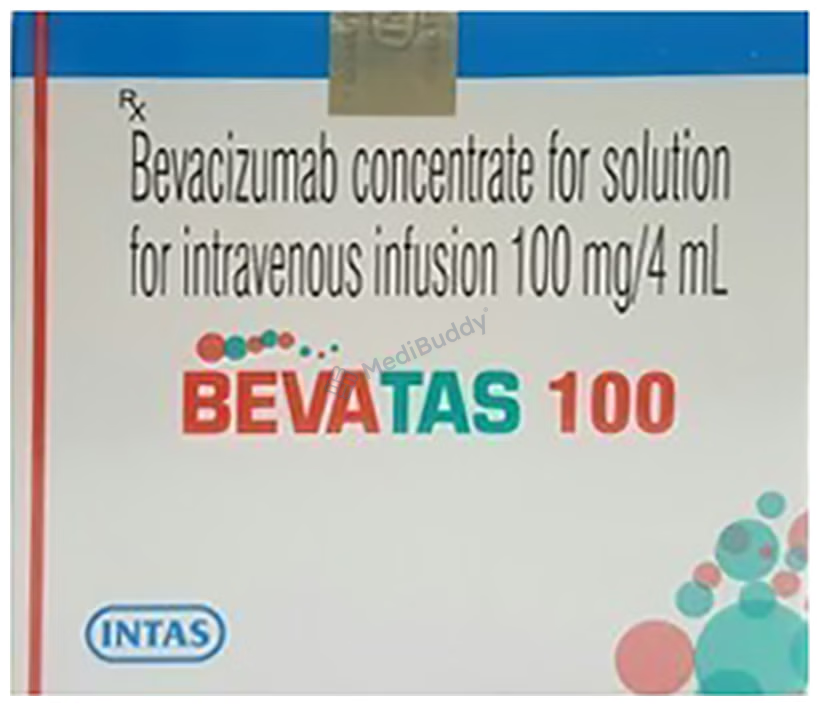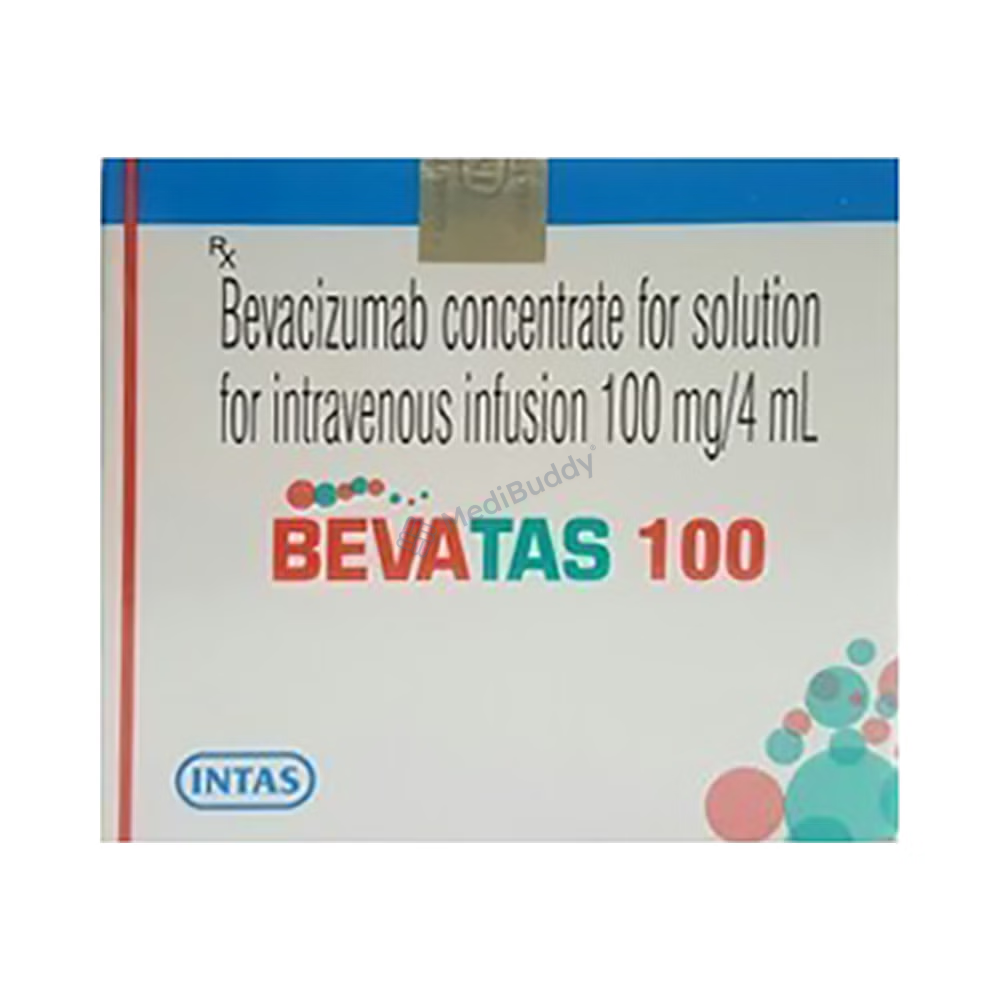Bevatas 100 Injection
By Bevatas
Rx
4ml Solution for Infusion in a Vial

Composition
Bevacizumab(100mg)

Manufacturer - Intas Pharmaceuticals Ltd
Chinubhai Centre, Off. Nehru Bridge, Ashram Road, Ahmedabad - 380009. Gujarat. India.

Expires on or after
November, 2026
About Bevatas 100 Injection
Bevatas 100 Injection is a medication used in the treatment of various types of cancer, including colon and rectum cancer, non-small cell lung cancer, kidney cancer, brain tumor, ovarian and cervical cancer. It is known as an anticancer medication that works by preventing the growth of new blood vessels that feed tumors and halting the growth of tumors.
This medicine is considered effective and is often used as a first-line treatment option in combination with other cancer medications. Bevatas 100 Injection is administered as an infusion, meaning it is given through a small needle in a vein or through a port under the skin. The dosage and duration of treatment will be determined by your doctor, who will also monitor you for any signs of infusion reactions, such as high blood pressure or breathing difficulties.
Patients are advised to continue taking Bevatas 100 Injection as long as their disease is under control and side effects are manageable. The decision to stop the medication will be made by the doctor based on your individual condition. Regular monitoring of blood pressure and protein levels in the urine may be recommended while on this medication.
Common side effects of Bevatas 100 Injection may include rectal bleeding, taste changes, and headaches. Patients are advised to inform their doctor if they are undergoing any surgical procedures, as Bevatas 100 Injection may affect wound healing and increase the risk of bleeding. Any unusual bleeding should be reported to the doctor promptly.
It is important to inform your healthcare provider if you are pregnant, planning pregnancy, or breastfeeding, as Bevatas 100 Injection may pose risks in these situations. Additionally, be sure to disclose all medications you are taking to avoid any potential interactions with Bevatas 100 Injection.
Benefits
Bevatas 100 Injection provides several benefits in treating various types of cancers. In colon and rectal cancer, it helps in treating the disease and reducing the risk of further cancerous growths. By killing or stopping the growth of cancer cells and preventing their multiplication, Bevatas 100 Injection is effective in combating the disease. The medication also aids in managing symptoms like blood in the stool, changes in bowel movements, weight loss, and fatigue.
For non-small cell lung cancer, Bevatas 100 Injection can be used alone or in combination with other medications to treat the cancer. It is known to be a potent medicine that targets cancer cells effectively. Patients undergoing this treatment are advised to avoid alcohol and smoking, and to stay hydrated by drinking plenty of water.
In kidney cancer cases, Bevatas 100 Injection is beneficial in treating symptoms such as blood in the urine, back pain, fatigue, and loss of appetite. By halting cancer growth and preventing the multiplication of cancer cells, the medication restricts the progression of the disease to other areas of the body. Following the doctor’s instructions diligently is crucial for successful recovery.
Moreover, Bevatas 100 Injection has shown positive outcomes in treating brain tumors by stopping the growth of cancer cells and preventing their multiplication. Patients with ovarian cancer also benefit from this medication as it targets the cancer cells effectively and impedes their growth. Although Bevatas 100 Injection is known to be effective, it may have bothersome side effects, underscoring the importance of discussing the risks and benefits with a healthcare provider.
Lastly, in cervical cancer, Bevatas 100 Injection is utilized to kill cancerous cells that develop in the cervix. Patients may experience symptoms like abnormal bleeding, foul-smelling discharge, and lower back pain. Considering the potential side effects associated with this medication, it is crucial to have a detailed discussion with a healthcare professional before commencing the treatment. Overall, Bevatas 100 Injection plays a vital role in combating various types of cancers by inhibiting the growth and multiplication of cancer cells, thereby offering hope and improved outcomes for patients.
How to use the Bevatas 100 Injection
To use Bevatas 100 Injection, it is important to know that it should only be administered by a doctor or nurse, and not by yourself. The injection comes in a 4 ml presentation and will be given to you by a healthcare professional. It is crucial to avoid self-administration of this medication. Remember to follow your healthcare provider's instructions carefully and do not attempt to inject Bevatas 100 on your own. By allowing a trained professional to administer the injection, you can ensure your safety and the effectiveness of the treatment.
Uses of Bevatas 100 Injection
Bevatas 100 Injection is used in the treatment of various types of cancers such as colon, lung, kidney, brain, ovarian, and cervical cancer. It is specifically indicated for the management of metastatic breast cancer, non-small cell lung cancer, kidney cancer, cervical cancer, epithelial ovarian cancer, fallopian tube cancer, primary peritoneal cancer, as well as colon and rectum cancer. Bevatas 100 Injection has proven effective in targeting and fighting these types of cancers, offering hope and treatment options for patients diagnosed with such conditions.
What conditions Bevatas 100 Injection treats?
Cancer is a condition characterized by the uncontrolled growth and reproduction of cells in a specific part of the body. These cancerous cells have the ability to invade and damage surrounding healthy tissues and organs. The development of cancer is often linked to mutations in genes responsible for regulating cell growth, leading to abnormal cell division and tumor formation. Common treatment approaches for cancer include surgery, chemotherapy, radiotherapy, stem cell transplantation, immunotherapy, and targeted drug therapy.
Should you consult a doctor?
If you experience any of the following symptoms while taking Bevatas 100 Injection, it is important to seek medical attention promptly. First, if you notice rectal bleeding, as this can be a serious side effect of the medication. Additionally, if you experience any taste changes, persistent headaches, nosebleeds, back pain, or dry skin, it is advisable to consult your doctor. High blood pressure, protein in the urine, and inflammation of the nose are other symptoms that warrant a medical evaluation. It is crucial to inform your healthcare provider if you are pregnant, planning pregnancy, or breastfeeding, as this may impact your treatment plan. Lastly, any unusual bleeding or concerns should be addressed with your doctor immediately to ensure proper management of your condition. Remember that your doctor is the best resource to address any potential side effects or issues related to Bevatas 100 Injection.
Side effects of Bevatas 100 Injection
When using Bevatas 100 Injection, you may experience some side effects as your body gets used to the medication. These side effects usually go away on their own and may not require medical treatment. However, it is important to consult your doctor if the following side effects persist or if you are concerned about them:
- Rectal bleeding
- Taste change
- Headache
- Nosebleeds
- Back pain
- Dry skin
- High blood pressure
- Protein in urine
- Inflammation of the nose
Additional side effects that may occur with the use of Bevatas 100 Injection include constipation, loss of appetite, fever, nose bleeds, change in speech, change in taste, voice changes or hoarseness, and loss of body weight. If any of these side effects are bothersome or worrisome, it is advisable to seek guidance from your healthcare provider.
Safety advice

liver
Bevatas 100 Injection can likely be used safely in patients with liver disease based on the limited data. It appears that adjusting the dose of Bevatas 100 Injection may not be necessary for these patients. It is essential to consult your doctor before using this injection, especially if you have liver issues.

kidney
Bevatas 100 Injection is considered safe for patients with kidney disease. Data indicates dose adjustment may not be necessary. Consult your doctor for guidance.

alcohol
It is not known if it is safe to drink alcohol while using Bevatas 100 Injection. Please consult your doctor before consumption.

driving
Be cautious when driving while using Bevatas 100 Injection as it may cause sleepiness and fainting, impacting your ability to drive safely.

pregnancy
Bevatas 100 Injection should be used with caution during pregnancy. Limited human studies and animal studies have shown potential harm to the developing baby. Your doctor will consider the benefits and risks before prescribing it. Please consult your doctor before using Bevatas 100 Injection.

breastfeeding
Be cautious when breastfeeding while using Bevatas 100 Injection as it may be unsafe. Limited human data indicates that the drug can pass into breastmilk and potentially harm the baby.
Consumption warning before consuming Bevatas 100 Injection
Before consuming Bevatas 100 Injection 4 ml, it is crucial to do so only under medical supervision. Your doctor will regularly monitor your condition while on this medication. If you have a history of allergic reactions to Bevatas 100 Injection 4 ml or other drugs, inform your doctor beforehand. It is advisable to avoid taking Bevatas 100 Injection 4 ml if you are pregnant; make sure to use effective contraception during treatment and for six months after the last dose. Bevatas 100 Injection 4 ml may lead to drowsiness and fainting, so refrain from driving while undergoing treatment. Discuss with your doctor if you have or had high blood pressure, heart attack, stroke, or any bleeding disorders. Do not breastfeed during treatment and six months post the final dose. Avoid getting immunizations or vaccinations without your doctor's approval while using Bevatas 100 Injection 4 ml, as it may increase bleeding risk. If you observe any unusual bleeding or bruising, promptly consult your doctor.
Disease interactions
When using Bevatas 100 Injection, it is crucial to inform your doctor about any history of infections, bleeding disorders, fistula formation, GI perforation, hypertension, PRES (Posterior Reversible Encephalopathy Syndrome), proteinuria, or thromboembolic disorders. These conditions can impact how the medication interacts with your body and may require special monitoring or adjustments to your treatment plan. Be sure to communicate openly with your healthcare provider to ensure the safe and effective use of Bevatas 100 Injection.
What if you forgot to take Bevatas 100 Injection?
If you forget to take a dose of Bevatas 100 Injection, it is important to seek guidance from your healthcare provider. Be sure to get in touch with your doctor for advice on what steps to take if you miss a dose of this medication. It is crucial to follow their instructions closely to ensure you stay on track with your treatment plan.
Related lab tests
The lab tests that are related to Bevatas 100 Injection include Carcino Embryonic Antigen (CEA), Complete Blood Count (CBC), Human Papilloma Virus (HPV), and Papanicolaou (PAP) Cytology. These tests are important for different reasons when monitoring patients who are receiving Bevatas 100 Injection.
1. Carcino Embryonic Antigen (CEA) test is used to detect the levels of a specific protein in the blood that may be elevated in certain types of cancer, including colorectal cancer. Monitoring CEA levels can help in assessing the response to treatment with Bevatas 100 Injection.
2. Complete Blood Count (CBC) test provides information about the different types of cells in the blood, including red blood cells, white blood cells, and platelets. This test can help in monitoring overall health and detecting any potential side effects of Bevatas 100 Injection on blood cell counts.
3. Human Papilloma Virus (HPV) test is used to detect the presence of HPV infection, which is a risk factor for cervical cancer. Screening for HPV is important in patients receiving Bevatas 100 Injection to assess the risk of developing HPV-related cancers.
4. Papanicolaou (PAP) Cytology, also known as a Pap smear, is a screening test for cervical cancer. It involves collecting cells from the cervix to examine under a microscope for any abnormalities. Regular Pap smears are essential for patients receiving Bevatas 100 Injection to monitor cervical health.
These related lab tests play a crucial role in monitoring the health and response to treatment of patients receiving Bevatas 100 Injection. Regular monitoring and follow-up with healthcare providers for these tests are essential to ensure the effectiveness and safety of treatment.
Additional Information
| Habit Forming | No |
| Chemical Class | Monoclonal Antibody |
| Therapeutic Class | - |
| Action Class | - |
FAQs
Disclaimer
The information provided on this website is to the best of our abilities to ensure it is accurate, reliable, and reviewed by a team of professionals. It should not be used to diagnose, prevent, or cure any health problem. The information presented here is not intended to create a doctor-patient relationship or replace a registered medical practitioner's advice, diagnosis, or treatment. The absence or provision of any information or warning regarding any medicine should not be assumed as an implied or explicit assurance of safety or efficacy. We highly recommend consulting your registered medical practitioner for all queries or doubts related to your medical condition. Do not ignore professional medical advice or delay seeking it based on the content encountered on our website. We intend to support, not replace, the doctor-patient relationship.
₹8740
₹9500
8% OFF
Inclusive of all taxes
Content verified by

Dr. Mansi Chaudhari
MBBS - General Medicine
Last update on 11-Feb-2025


